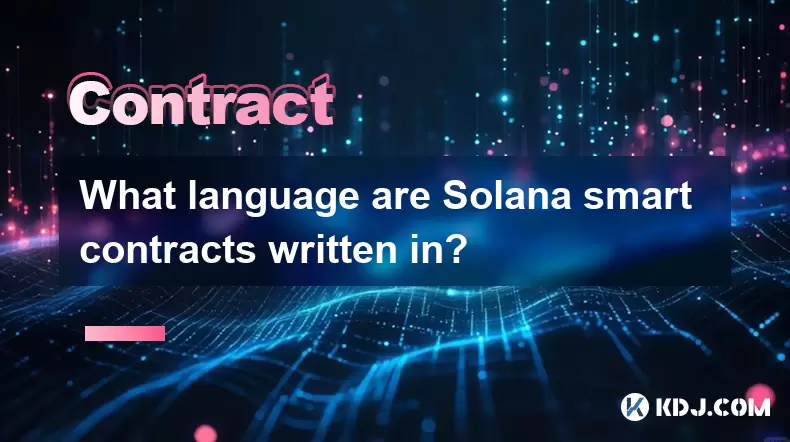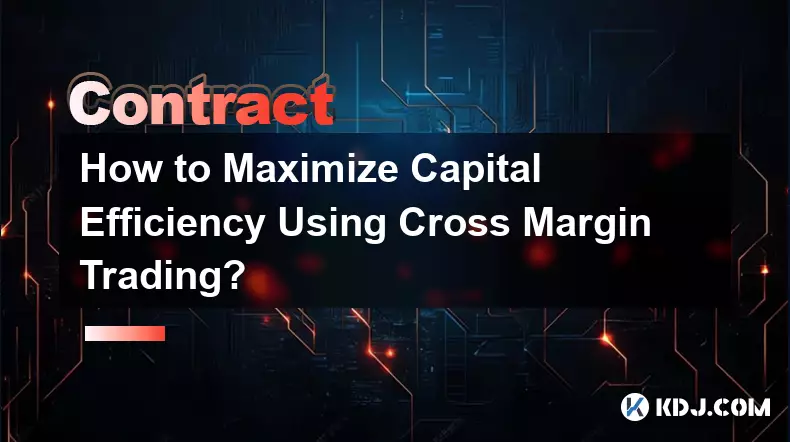-
 bitcoin
bitcoin $87959.907984 USD
1.34% -
 ethereum
ethereum $2920.497338 USD
3.04% -
 tether
tether $0.999775 USD
0.00% -
 xrp
xrp $2.237324 USD
8.12% -
 bnb
bnb $860.243768 USD
0.90% -
 solana
solana $138.089498 USD
5.43% -
 usd-coin
usd-coin $0.999807 USD
0.01% -
 tron
tron $0.272801 USD
-1.53% -
 dogecoin
dogecoin $0.150904 USD
2.96% -
 cardano
cardano $0.421635 USD
1.97% -
 hyperliquid
hyperliquid $32.152445 USD
2.23% -
 bitcoin-cash
bitcoin-cash $533.301069 USD
-1.94% -
 chainlink
chainlink $12.953417 USD
2.68% -
 unus-sed-leo
unus-sed-leo $9.535951 USD
0.73% -
 zcash
zcash $521.483386 USD
-2.87%
What language are Solana smart contracts written in?
Solana smart contracts, written in Rust or C/C++, enable scalable decentralized apps with high throughput and low fees.
Jul 17, 2025 at 08:07 am

Understanding Smart Contracts on Solana
Smart contracts are self-executing agreements with the terms directly written into code. On the Solana blockchain, these contracts enable decentralized applications (dApps) to perform a variety of functions without intermediaries. Solana is known for its high throughput and low transaction fees, which makes it an attractive platform for developers building scalable applications.
The execution environment for smart contracts on Solana is called BPF (Berkeley Packet Filter), which has been adapted for use in the Solana runtime. This environment allows smart contracts to run efficiently while maintaining security and speed.
Programming Languages Supported by Solana
Solana smart contracts can be written in multiple languages, but the most commonly used one is Rust. Rust is favored for its performance, safety features, and compatibility with BPF. Developers who want to write smart contracts on Solana typically use Rust because it provides strong memory safety guarantees without requiring garbage collection.
In addition to Rust, Solana also supports C and C++ for writing smart contracts. These languages are suitable for developers who prefer working with lower-level constructs or need fine-grained control over system resources.
- Rust: Most widely used language for Solana smart contracts.
- C/C++: Alternative options for developers with experience in systems programming.
Each language compiles down to eBPF bytecode, which is executed by the Solana Virtual Machine (SVM).
Setting Up the Development Environment
Before writing a smart contract on Solana, developers must configure their development environment properly. The first step involves installing Rust using rustup, the official Rust toolchain installer.
- Download and install rustup from the official Rust website.
- Add the eBPF target using the command
rustup target add bpfel-unknown-none-gnu. - Install the Solana CLI tools via the official installation guide.
Once the environment is set up, developers can start creating their smart contracts using Anchor, a popular framework that simplifies contract development with Rust.
Using Anchor Framework for Smart Contract Development
Anchor is a powerful framework that abstracts many complexities involved in writing raw Solana programs. It provides a structured way to define state, instructions, and accounts, making development more intuitive.
To begin with Anchor:
- Create a new project using the command
anchor init my_solana_contract. - Define your program logic inside the
programs/directory. - Use IDL (Interface Definition Language) files generated automatically by Anchor to interface with frontends or other services.
Anchor also includes built-in testing utilities and integrates seamlessly with the Solana CLI, allowing developers to deploy and test contracts locally before deploying them to the mainnet.
Deploying and Testing Smart Contracts on Solana
After writing the smart contract code, the next step involves compiling and deploying it to the Solana network. Deployment is done using the Solana CLI:
- Compile the program using
anchor build. - Deploy the compiled program using
solana program deploy.
Testing is crucial to ensure the contract behaves as expected. Developers can write unit tests in Rust or use Anchor's testing framework to simulate transactions and verify outcomes.
- Write test cases within the
tests/directory. - Run tests using
anchor test.
It’s important to simulate different scenarios and edge cases to catch potential vulnerabilities before deployment.
Common Challenges and Best Practices
Developing smart contracts on Solana comes with unique challenges such as handling account management, ensuring instruction correctness, and optimizing for low latency.
Some best practices include:
- Always validate account ownership and permissions before performing operations.
- Use Anchor macros like
#[account]to simplify account struct definitions. - Keep contract logic modular and well-documented.
- Perform extensive testing on devnet before moving to testnet or mainnet.
Avoiding common pitfalls like uninitialized accounts or incorrect data serialization helps maintain contract integrity and user trust.
Frequently Asked Questions
Q: Can I write Solana smart contracts in Python?A: Currently, Solana does not natively support Python for smart contract development. However, some experimental tools and third-party frameworks may allow limited Python-to-BPF compilation.
Q: Is it possible to reuse Ethereum Solidity code on Solana?A: No, Solidity is designed for the Ethereum Virtual Machine (EVM), whereas Solana uses the Solana Virtual Machine (SVM). The underlying architectures differ significantly, making direct porting impractical.
Q: Are there any IDE plugins for Solana smart contract development?A: Yes, popular IDEs like VS Code have extensions for Rust and Solana development. Plugins such as Rust Analyzer and Solana Extension Pack provide syntax highlighting, debugging, and integration with the Solana CLI.
Q: How do I debug a deployed Solana smart contract?A: Debugging can be done using logs emitted during instruction execution. The Solana CLI command solana logs displays real-time logs from the network. Additionally, developers can use Anchor’s test suite and local validator for detailed debugging sessions.
Disclaimer:info@kdj.com
The information provided is not trading advice. kdj.com does not assume any responsibility for any investments made based on the information provided in this article. Cryptocurrencies are highly volatile and it is highly recommended that you invest with caution after thorough research!
If you believe that the content used on this website infringes your copyright, please contact us immediately (info@kdj.com) and we will delete it promptly.
- Bitcoin Drops Amidst Analyst Warnings and Shifting Market Sentiment
- 2026-02-05 09:40:02
- Georgia Brothers Sentenced to 20 Years for Elaborate COAM Gambling Fraud Scheme
- 2026-02-05 09:45:01
- MicroStrategy Stock Loss: Pension Funds Face 60% Plunge Amidst Crypto Volatility
- 2026-02-05 10:55:01
- Super Bowl LX: Teddy Swims, Green Day, and a Legacy Toss Set for 2026 Extravaganza
- 2026-02-05 07:20:02
- Fantasy Football Premier League Round 25: Key Player Picks, Tips, and Advice for Optimal Team Performance
- 2026-02-05 07:15:02
- Remittix Launches PayFi Platform with a Generous 300% Bonus Offer, Driving Investor Excitement
- 2026-02-05 07:05:01
Related knowledge

How to Manage Emotions and "Revenge Trading" in Futures?
Feb 05,2026 at 12:19am
Understanding Emotional Triggers in Futures Markets1. Market volatility directly impacts psychological states, often amplifying fear or euphoria based...

How to Analyze Market Sentiment Using the Fear and Greed Index?
Feb 05,2026 at 07:40am
Understanding the Fear and Greed Index1. The Fear and Greed Index is a composite metric designed to quantify prevailing emotional states among cryptoc...

How to Use Volume Profile to Find Key Futures Entry Levels?
Feb 04,2026 at 11:39pm
Understanding Volume Profile Structure1. Volume Profile displays the distribution of traded volume at specific price levels over a defined time period...

How to Trade Bitcoin Futures with 100x Leverage? (High-Risk Setup)
Feb 05,2026 at 11:00am
Understanding Bitcoin Futures Mechanics1. Bitcoin futures contracts represent agreements to buy or sell BTC at a predetermined price and date in the f...

How to Maximize Capital Efficiency Using Cross Margin Trading?
Feb 05,2026 at 12:40am
Cross Margin Trading Fundamentals1. Cross margin trading allows traders to use their entire account balance as collateral for open positions across mu...

How to Trade Crypto Contracts During Major News Events? (CPI/FOMC)
Feb 05,2026 at 09:59am
Understanding Market Sensitivity to Macro Data Releases1. Cryptocurrency futures markets exhibit pronounced volatility during U.S. CPI and FOMC announ...

How to Manage Emotions and "Revenge Trading" in Futures?
Feb 05,2026 at 12:19am
Understanding Emotional Triggers in Futures Markets1. Market volatility directly impacts psychological states, often amplifying fear or euphoria based...

How to Analyze Market Sentiment Using the Fear and Greed Index?
Feb 05,2026 at 07:40am
Understanding the Fear and Greed Index1. The Fear and Greed Index is a composite metric designed to quantify prevailing emotional states among cryptoc...

How to Use Volume Profile to Find Key Futures Entry Levels?
Feb 04,2026 at 11:39pm
Understanding Volume Profile Structure1. Volume Profile displays the distribution of traded volume at specific price levels over a defined time period...

How to Trade Bitcoin Futures with 100x Leverage? (High-Risk Setup)
Feb 05,2026 at 11:00am
Understanding Bitcoin Futures Mechanics1. Bitcoin futures contracts represent agreements to buy or sell BTC at a predetermined price and date in the f...

How to Maximize Capital Efficiency Using Cross Margin Trading?
Feb 05,2026 at 12:40am
Cross Margin Trading Fundamentals1. Cross margin trading allows traders to use their entire account balance as collateral for open positions across mu...

How to Trade Crypto Contracts During Major News Events? (CPI/FOMC)
Feb 05,2026 at 09:59am
Understanding Market Sensitivity to Macro Data Releases1. Cryptocurrency futures markets exhibit pronounced volatility during U.S. CPI and FOMC announ...
See all articles










































































